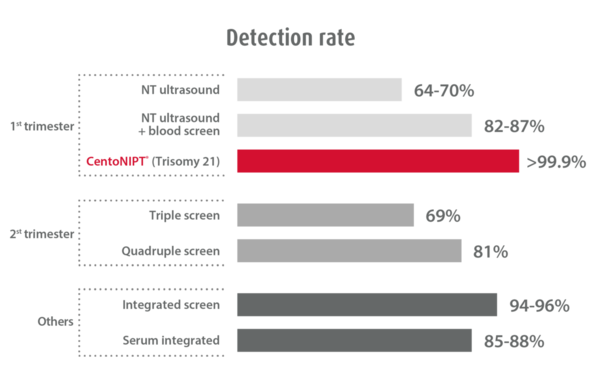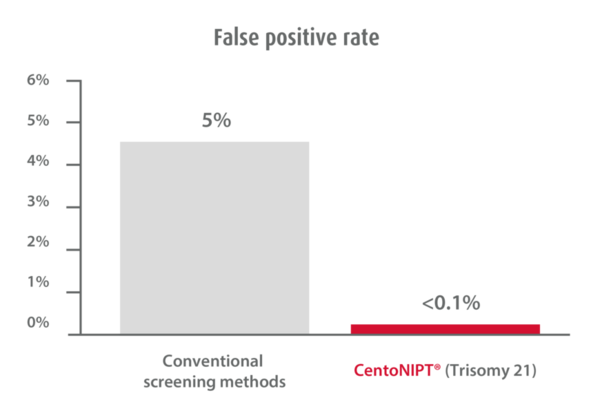Non-Invasive Prenatal Testing – No Risk to Mother and Baby
Want to make sure that your baby is growing and developing normally during pregnancy? CentoNIPT® – Safe and accurate prenatal testing – Offers you information about the health and development of your child from as early as the 10th week of pregnancy.*
Non-invasive prenatal testing (NIPT) is a new method of testing for common chromosomal abnormalities that can occur in a developing baby. While rare, these chromosome abnormalities can have profound consequences to the life and health of you and your child and it is important to find out as soon as possible.
How Does NIPT Work?
Small amounts of a baby’s DNA passes into the bloodstream of the mother during pregnancy. New technology allows us to analyse this DNA directly from the mother’s blood and screen for chromosomal abnormalities.
Previously, it was only possible to test for these abnormalities with highly invasive procedures that carried a risk to the pregnancy. Chorionic villus sampling (CVS) can be performed between weeks 10-12 and pregnancy, and amniocentesis performed between weeks 15–18 of pregnancy. These tests carry up to 1 in 150 or 1 in 100 chance of miscarriage respectively.
Initial screening with non-invasive prenatal testing can help to avoid this potentially unnecessary and invasive testing. There is no risk to mother or baby and NIPT provides the earliest testing available.
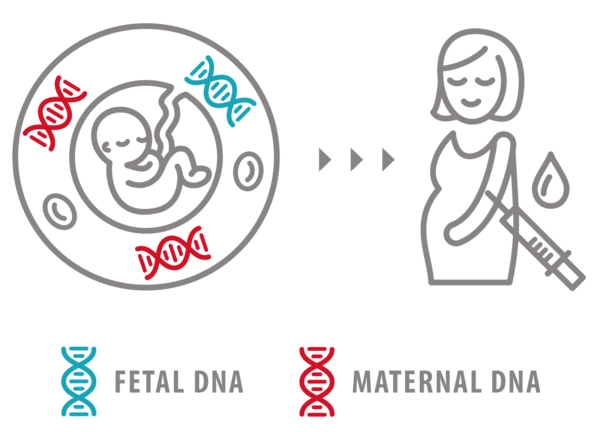
Reliable testing
Expertise You Can Trust
Non-invasive prenatal testing (NIPT) is a new method of testing for common chromosomal abnormalities that can occur in a developing baby. While rare, these chromosome abnormalities can have profound consequences to the life and health of you and your child and it is important to find out as soon as possible.
What Does CentoNIPT Screen For?
- Down syndrome (Trisomy 21), which is caused by an extra copy of chromosome 21. Mild/moderate mental retardation and risk of some birth defects (affects 1 in 1,000 live births).
- Edwards syndrome (Trisomy 18), which is caused by an extra copy of chromosome 18. Severe mental retardation and risk of multiple birth defects (affects 1 in 3,000-6,000 live births).
- Patau syndrome (Trisomy 13), which is caused by an extra copy of chromosome 13. Severe mental retardation and risk of multiple birth defects (affects 1 in every 5,000 live births).
The test can also detect abnormalities of the sex chromosomes:
- Turner syndrome (Monosomy X), which is caused by a missing X chromosome in females
- Klinefelter syndrome (XXY), which is caused by an extra X chromosome in males
- Jacobs syndrome (XYY), which is caused by an extra Y chromosome in males
- Triple X syndrome (XXX), which is caused by an extra X chromosome in females
Why should you choose CentoNIPT?
- Completely safe for you and your baby
- High level of accuracy
- Test from the 10th week of pregnancy
- Only a single blood sample required
- Results returned within 5 business days of sample receipt
What Does the Result Mean?
Positive Result
Positive result means that it is likely that your baby will have one of the tested conditions, for example Down syndrome or another. If the result of your non-invasive prenatal test is positive, you should consult with your doctor and plan another diagnostic testing to confirm this result or exclude diagnosis related to that result.
Negative Result
Negative result means that it is unlikely your baby will have Down syndrome or another chromosomal defect analyzed by this non-invasive prenatal test. However, due to technique limitations, a certain subgroup of diseases is not detectable by this test. Hence this negative result does not completely eliminate the possibility of certain genetic defects not assessed by this screening. In case any possible abnormalities are detected on ultrasound investigation, or in case of any genetic disorder known in your family, you should undergo further genetic counselling and discuss the risk with your doctor to access whether further testing is necessary.
Learn More About Non-Invasive Prenatal Testing
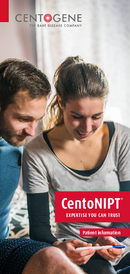
CentoNIPT – Patient Information
How does non-invasive prenatal testing work?
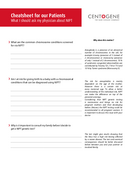
What To Ask Your Doctor About NIPT
Cheatsheet for our Patients: What I should ask my physician about NIPT
Frequently Asked Questions NIPT
Yes, the portion of your twins’ DNA within your maternal blood can be analyzed in the same way as for singleton pregnancies.
Yes, reporting the gender is one option in NIPT. In general, the gender information will not be provided before 12 weeks of gestation, as regulated by German law.
NIPT can be performed already after 10 weeks of gestation; whereas chorionic villus sampling is done between 10-12 weeks of gestation; amniocentesis between 14 -16 weeks of gestation.
NIPT calculates the risk of the defined chromosomal disorders and helps your doctor to estimate these risk. The result is presented as “YES” or “NO”
YES – indicates an extra copy of one chromosome is detected. An invasive prenatal genetic test will be necessary to confirm the genetic diagnosis.
NO – no extra copy of the specific chromosomes. The risk of being affected is low.
Compared to conventional screening methods like ultrasound or serum screening, the reliability of NIPT is much higher.
NIPT is non-invasive prenatal test. For this test, only 9 ml blood will be sufficient. The procedure is completely risk free for mother and baby.
During pregnancy, there are pieces of your baby’s DNA circulating in your own blood. NIPT analyzes these DNA to pinpoint a baby’s risk of having specific genetic disorders, including Down syndrome, Patau syndrome, Edwards syndrome, and several gender chromosomal disorders.
Notation
Sample Preparation and analysis software are CE-IVD marked
Noninvasive prenatal testing (NIPT) based on cell-free DNA analysis from maternal blood is a screening test; it is not diagnostic. Test results must not be used as the sole basis for diagnosis. Further confirmatory testing is necessary prior to making any irreversible pregnancy decision.

*Note: CentoNIPT® is unavailable in the US.
Consult Your Doctor
The information obtained from genetic testing can have a profound impact on your life. Prior to any genetic testing, we strongly recommend that you seek genetic counseling to understand more about which testing options might be beneficial for you and your family members. Genetic counseling is also recommended to help you understand your genetic test results and their implications for other family members.
At CENTOGENE, we only accept genetic tests ordered by a doctor on your behalf. As genetic testing and test results are complex, we want to ensure that you have access to full support to help you make informed decisions about genetic testing and your future healthcare.

